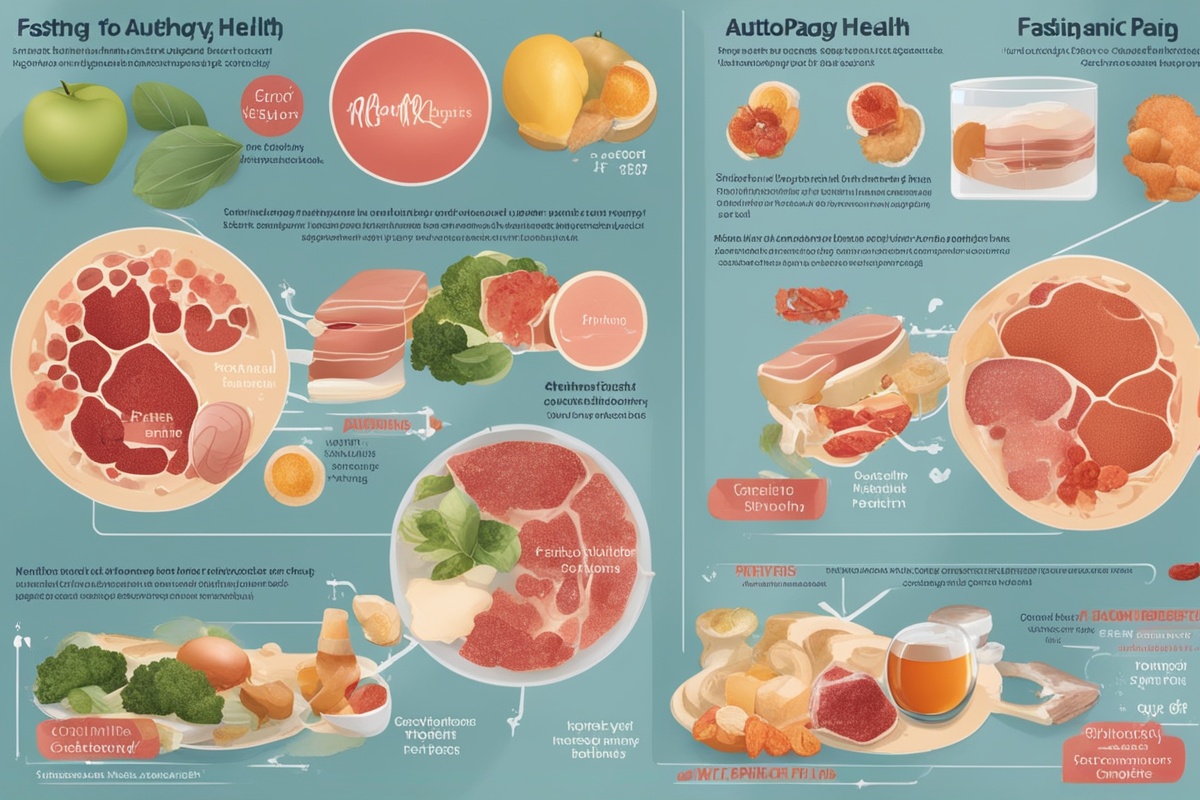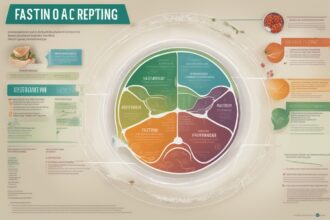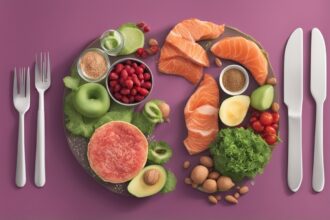Hey there, health enthusiasts! If you’ve been diving into the world of fasting for wellness, you’ve probably stumbled upon the term “autophagy.” It’s a buzzword in the fasting community, often tied to the incredible concept of cellular repair fasting. But what exactly is autophagy, and how does it connect to fasting? In this deep dive, we’re going to unpack the science behind autophagy, explore how fasting triggers this natural cleansing process, and share actionable tips to harness its benefits for better health and longevity. Whether you’re a seasoned faster or just curious about optimizing your body’s repair mechanisms, stick with me as we break it all down in a way that’s easy to grasp yet grounded in science.
What Is Autophagy and Why Does It Matter?
Let’s start with the basics. Autophagy, derived from Greek words meaning “self-eating,” is a cellular process where your body cleans house. Think of it as a built-in recycling system: cells break down and remove damaged components like misfolded proteins, dysfunctional organelles, and even pathogens. This isn’t just tidying up—it’s critical for maintaining cellular health, preventing disease, and promoting longevity. Research shows that autophagy plays a key role in protecting against conditions like cancer, neurodegenerative disorders, and infections (Levine & Kroemer, 2019).
Why should you care? Well, as we age, autophagy naturally slows down, leaving us more vulnerable to cellular damage and related health issues. That’s where cellular repair fasting comes in. Fasting, particularly intermittent fasting or extended fasts, can kickstart autophagy, essentially hitting the reset button on your cells. It’s like giving your body a chance to declutter and rebuild stronger, which is why so many people in the fasting community are obsessed with this process.
How Fasting Triggers Autophagy for Cellular Repair
Now, let’s get into the nitty-gritty of how fasting and autophagy are linked. When you eat, your body is busy digesting and storing energy, primarily in the form of glucose and fat. But when you fast, your energy reserves dip, and your cells switch into survival mode. This metabolic shift signals the activation of autophagy as a way to generate energy and materials by recycling internal components (Mizushima & Komatsu, 2011).
During fasting, levels of a hormone called glucagon rise, while insulin drops. This hormonal change, combined with reduced nutrient signaling (like mTOR inhibition), tells your cells it’s time to clean up and conserve resources. Studies suggest that autophagy ramps up significantly after about 12–16 hours of fasting in humans, though the exact timing can vary based on factors like diet and activity levels (Bagherniya et al., 2018). This is why fasting for cellular repair is such a powerful tool—it leverages your body’s natural response to nutrient scarcity to enhance health at the microscopic level.
Health Benefits of Autophagy Through Fasting
The benefits of autophagy induced by cellular repair fasting are pretty mind-blowing when you look at the research. Here are some of the standout ways this process can transform your health:
- Improved Longevity: Autophagy helps clear out cellular junk, reducing oxidative stress and inflammation—key drivers of aging. Animal studies show that boosting autophagy can extend lifespan (Rubinsztein et al., 2011).
- Neuroprotection: By removing toxic protein aggregates, autophagy may lower the risk of diseases like Alzheimer’s and Parkinson’s (Komatsu et al., 2006).
- Enhanced Immunity: Autophagy helps eliminate intracellular pathogens and supports immune cell function, strengthening your body’s defenses (Deretic et al., 2013).
- Metabolic Health: Fasting-induced autophagy can improve insulin sensitivity and reduce fat accumulation, supporting weight management and reducing diabetes risk.
These benefits aren’t just theoretical—they’re backed by a growing body of evidence. That said, human studies are still catching up to animal research, so while the potential is exciting, it’s important to approach fasting with realistic expectations.
Practical Tips to Boost Autophagy with Fasting
Ready to tap into the power of cellular repair through fasting? You don’t need to be a scientist to make this work for you. Here are some practical, everyday strategies to activate autophagy and support your body’s natural repair processes. Remember, consistency and balance are key—don’t overdo it, especially if you’re new to fasting.
- Start with Intermittent Fasting (IF): Try a 16:8 fasting schedule—fast for 16 hours and eat during an 8-hour window. This gives your body enough time to dip into autophagy mode without extreme hunger.
- Extend Fasts Occasionally: Once you’re comfortable with IF, experiment with a 24–48 hour fast once a month. Research suggests longer fasts can deepen autophagic activity (Bagherniya et al., 2018).
- Stay Hydrated: Drink plenty of water during fasting periods to support cellular processes and prevent dehydration, which can stress your system.
- Focus on Nutrient-Dense Refeeds: When breaking your fast, prioritize whole foods like vegetables, lean proteins, and healthy fats to provide raw materials for cellular repair.
- Avoid Overeating Post-Fast: Bingeing after fasting can spike insulin and halt autophagy, so ease back into eating with small, balanced meals.
Before jumping into any fasting regimen, especially longer fasts, chat with a healthcare provider, particularly if you have underlying conditions like diabetes or low blood pressure. Fasting for autophagy is powerful, but safety always comes first.
Other Lifestyle Factors to Enhance Autophagy
While fasting and cellular repair go hand in hand, fasting isn’t the only way to support autophagy. Your overall lifestyle plays a huge role in how effectively your body cleans and repairs itself. Think of fasting as one piece of the puzzle—combine it with these habits to maximize the benefits.
For starters, exercise is a fantastic autophagy booster. High-intensity interval training (HIIT) and resistance training can mimic the metabolic stress of fasting, triggering similar cellular cleanup pathways. Sleep is another biggie—poor sleep disrupts autophagy and ramps up cellular stress, so aim for 7–9 hours of quality rest per night. Lastly, consider cutting back on processed sugars and refined carbs in your diet. These foods keep insulin levels high, which can suppress autophagy even during fasting windows. By pairing autophagy fasting benefits with these habits, you’re setting the stage for optimal health.
Potential Risks and Misconceptions About Fasting for Autophagy
Before you get too hyped about cellular repair fasting, let’s talk about the flip side. Fasting isn’t a magic bullet, and it’s not for everyone. For some, especially those with eating disorders, low body weight, or certain medical conditions, fasting can do more harm than good. It’s also worth noting that while autophagy sounds amazing, over-activating it through extreme fasting might stress cells rather than help them, though more research is needed to clarify this in humans (Levine & Kroemer, 2019).
There’s also a lot of hype around autophagy that isn’t fully backed by science yet. For instance, while we know fasting triggers autophagy, we don’t have precise ways to measure how much is happening in your body or how much is “enough” for health benefits. So, while I’m a huge fan of fasting for cellular health, I encourage you to stay grounded and avoid treating it as a cure-all. Balance is everything—fasting should complement a healthy lifestyle, not replace it.
As we wrap up, I hope you’re as fascinated by autophagy as I am. This incredible process of cellular renewal, powered by cellular repair fasting, offers a window into how our bodies are designed to heal and thrive under the right conditions. From potentially slowing aging to bolstering immunity, the benefits of autophagy are hard to ignore. By incorporating fasting—whether it’s a daily 16:8 schedule or an occasional longer fast—along with supportive habits like exercise and good sleep, you can give your cells the best shot at staying healthy. Just remember to listen to your body, start slow, and consult a professional if you’re unsure. Here’s to unlocking your body’s natural repair system and feeling your best, one fast at a time!
References
- Bagherniya, M., Butler, A. E., Barreto, G. E., & Sahebkar, A. (2018). The effect of fasting or calorie restriction on autophagy induction: A review of the literature. Ageing Research Reviews, 47, 183–197. https://doi.org/10.1016/j.arr.2018.08.004
- Deretic, V., Saitoh, T., & Akira, S. (2013). Autophagy in infection, inflammation and immunity. Nature Reviews Immunology, 13(10), 722–737. https://doi.org/10.1038/nri3532
- Komatsu, M., Waguri, S., Chiba, T., Murata, S., Iwata, J., Tanida, I., … & Tanaka, K. (2006). Loss of autophagy in the central nervous system causes neurodegeneration in mice. Nature, 441(7095), 880–884. https://doi.org/10.1038/nature04723
- Cell, 176(1-2), 11–42. https://doi.org/10.1016/j.cell.2018.09.048
- Mizushima, N., & Komatsu, M. (2011). Autophagy: Renovation of cells and tissues. Cell, 147(4), 728–741. https://doi.org/10.1016/j.cell.2011.10.026
- Rubinsztein, D. C., Mariño, G., & Kroemer, G. (2011). Autophagy and aging. Cell, 146(5), 682–695. https://doi.org/10.1016/j.cell.2011.07.030






